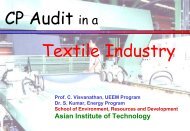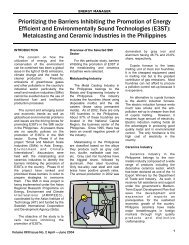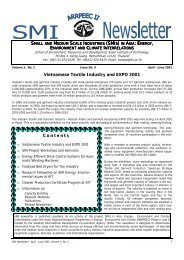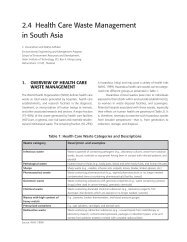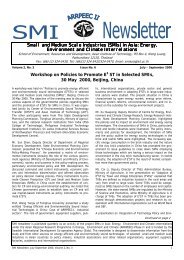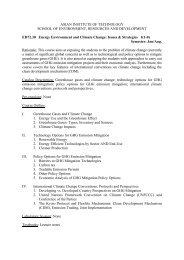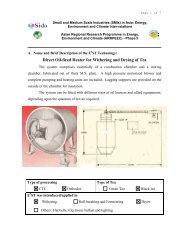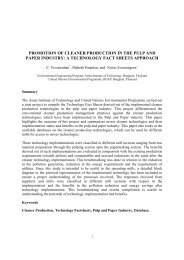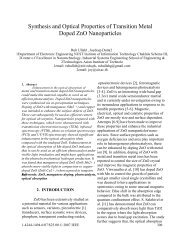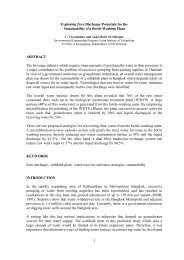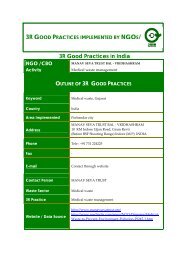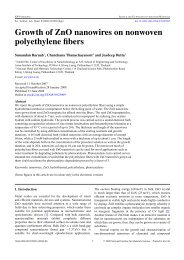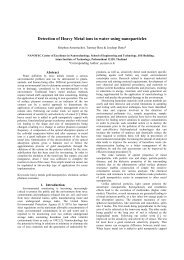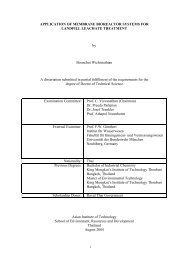A Gap Analysis in Selected Asian Countries, 3R Knowledge Hub ...
A Gap Analysis in Selected Asian Countries, 3R Knowledge Hub ...
A Gap Analysis in Selected Asian Countries, 3R Knowledge Hub ...
Create successful ePaper yourself
Turn your PDF publications into a flip-book with our unique Google optimized e-Paper software.
chapter 4<br />
Conclusions &<br />
Recommendations<br />
A review of prevail<strong>in</strong>g waste management<br />
practices and technology gaps towards<br />
implement<strong>in</strong>g <strong>3R</strong> was conducted for some<br />
<strong>Asian</strong> countries. The scope of the study was<br />
restricted primarily to three sectors: urban<br />
municipal waste, healthcare waste and e-waste.<br />
The follow<strong>in</strong>g sections provide a<br />
comprehensive <strong>in</strong>terpretation of the results.<br />
URBAN MUNICIPALWASTE<br />
An analysis of urban municipal waste<br />
management <strong>in</strong>dicates that <strong>3R</strong>-oriented<br />
technologies such as thermal recovery (direct<br />
combustion of waste to recover heat) and fuel<br />
recovery (production of refuse-derived fuel and<br />
packag<strong>in</strong>g-derived fuel from waste) are<br />
effectively practiced <strong>in</strong> Japan, S<strong>in</strong>gapore, Korea,<br />
India and Malaysia. Technologies such as<br />
<strong>in</strong>c<strong>in</strong>eration are formally strong <strong>in</strong> Korea,<br />
Ch<strong>in</strong>a, Malaysia and Thailand. It was observed<br />
that successful countries with better<br />
technologies have adequate management and<br />
policy <strong>in</strong>struments. In countries like Cambodia<br />
and Vietnam, technologies for material<br />
recovery, sort<strong>in</strong>g and pulveriz<strong>in</strong>g were found to<br />
be <strong>in</strong>formal but strongly practiced. Remarkable<br />
technology gaps were found <strong>in</strong> Bhutan<br />
followed by Cambodia due to <strong>in</strong>sufficient<br />
national policies, barriers to access <strong>in</strong>ternational<br />
<strong>in</strong>formation, technology and services, and<br />
<strong>in</strong>sufficient <strong>in</strong>ternational cooperation.<br />
HEALTHCARE WASTE<br />
Among the <strong>3R</strong>-based technologies for<br />
healthcare waste, <strong>in</strong>c<strong>in</strong>eration was observed to<br />
be predom<strong>in</strong>ant <strong>in</strong> countries such as Japan,<br />
S<strong>in</strong>gapore, Ch<strong>in</strong>a, Korea, Malaysia and<br />
Thailand. Waste-to-energy technologies for<br />
recover<strong>in</strong>g thermal, fuel and materials were<br />
found to be practiced strongly <strong>in</strong> S<strong>in</strong>gapore,<br />
Korea and Malaysia. In India, although various<br />
technologies are practiced, they are often<br />
observed to be <strong>in</strong>formal, but strongly deployed.<br />
This is due to the <strong>in</strong>adequate policies and<br />
management system. On the other hand,<br />
countries like Philipp<strong>in</strong>es, though hav<strong>in</strong>g<br />
appropriate policies and essential <strong>in</strong>struments,<br />
lack cooperation and good practices. Vietnam<br />
and Bhutan are among the countries show<strong>in</strong>g<br />
<strong>in</strong>sufficient management systems and policy<br />
aspects.<br />
E-WASTE<br />
In the case of e-waste, Japan was found to have<br />
formal and strong technologies like material<br />
recovery, sort<strong>in</strong>g and pulverization. Next are<br />
Korea and Thailand with successful practices <strong>in</strong><br />
material recovery and sort<strong>in</strong>g. Among the other<br />
countries, Cambodia was observed to be<br />
<strong>in</strong>formal but with strong practices. <strong>Countries</strong><br />
such as Bangladesh and Ch<strong>in</strong>a were found to<br />
have largely <strong>in</strong>formal and weak systems. This<br />
can be attributed to the <strong>in</strong>sufficient<br />
management and policy frameworks.<br />
In essence, an overview of the current practices<br />
of waste management <strong>in</strong>dicates that:<br />
• Recycl<strong>in</strong>g is predom<strong>in</strong>antly <strong>in</strong> the <strong>in</strong>formal<br />
sector and uses primitive technology.<br />
• Very little <strong>in</strong>stances of promot<strong>in</strong>g formal, <strong>3R</strong>based<br />
solutions for waste crisis exist.<br />
• Specific policies emphasiz<strong>in</strong>g the need for <strong>3R</strong><br />
are very rare <strong>in</strong> <strong>Asian</strong> countries with<br />
exceptions of some developed nations <strong>in</strong> the<br />
region.<br />
• Technology Transfer and Policy<br />
Reformulation are essential to promote <strong>3R</strong>s.<br />
• Cooperative and concerted efforts between<br />
and with<strong>in</strong> countries are at the hour of need<br />
to promote a <strong>3R</strong>-based economy.<br />
Chapter 4: Conclusions & Recommendations<br />
131



